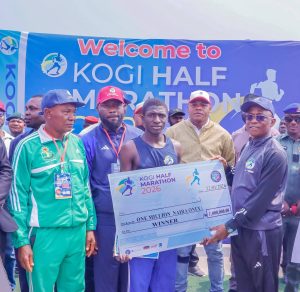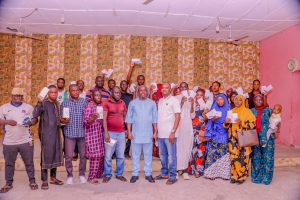Kogi SIP Team: Providing Succour To The Underprivileged

By Abdullahi Omanibe
When the President Muhammadu Buhari-led administration conceptualized its National Social Investment Policy (NSIP), it was actually targeted at Nigerians who suffer from fatal economic vulnerabilities. A lot of this class of Nigerians lives in the rural areas far from the epicentres of civilization in the cities.
An integral part of the NSIP is the N-Power scheme meant to provide an economic leeway for young unemployed graduates and non-graduates alike from ages 18 to 35 pending when they are fully employed either in the private or public sectors. Or when some of them become self-employed due to the entrepreneurial skills they might have acquired in the course of being enlisted on the scheme.
Barring some minuses here and there, the N-Power scheme has been a tremendous success for the past four years since its inception in 2016. There is room for improvement, though, which is normal as with every human undertaking. In all, there have been two batches of the scheme – Batch A(inaugural team) and Batch B(the second generation of beneficiaries), totalling 500, 000 in number, whose monthly financial allowance of Thirty Thousand Naira will stop henceforth by the end of the month of July having enjoyed same for three or four years unfailingly.
According to the minister of Humanitarian Affairs, Disaster Management and Social Development, Hajiya Sadiya Umar Farouq, whose office now coordinates the social investment policies of the FG, easing off the aforementioned batches by the end of July is to enable another batch of young disadvantaged Nigerians who meet the criteria for consideration benefit from the scheme. She also said the new beneficiaries will play a key role in helping to revitalize the Nigerian economy, post- COVID-19.
For the potential new beneficiaries of the scheme, online registration has since commenced on June 26. According to available statistics, over one million young Nigerians have registered within a week of opening the portal. This is where the Kogi SIP Team has made a commendable intervention for disadvantaged young people in the state to get them registered.
Rather than sit in the office and just wait for directive or briefing from Abuja regarding the NSIP, the team has deployed its men to all the 21 local government areas in the state, helping graduates and non-graduates alike who don’t have access to the internet to get registered for the scheme before the expiration of the deadline. This, in no small way, has eased off the burden of registration for them, in addition to helping them increase their chances of being selected eventually. You have to register to be selected. You don’t register, you don’t get selected.
With the Team providing succour to the less-privileged young Kogites by helping them to get registered for the Batch C N-Power scheme, the possibility of them being duped by persons parading themselves as ‘registration agents’ after collecting some fees from them has been completely eliminated. This is another plus.
For emphasis, among the outgoing Batches A and B, through Kogi SIP Team, over 12,000 Kogites have benefited from the N-Power scheme.
The NSIP is not all about N-Power, it also has other key components like the Conditional Cash Transfer (Household Uplifting Programme), Government Enterprise and Empowerment Program me (tradermoni, marketmoni, farmermoni) and the Home Grown School Feeding Programme (HGSF)
The CCT programme directly supports those within the lowest poverty bracket by improving nutrition, increasing household consumption through cash benefit of N5,000 monthly. Kogi State as a YESSO State is one of the 8 pilot States that started the Cash transfer program in 2016. It has two categories of cash transfers and a livelihood support targeted at poor and vulnerable households.
Aside the direct cash transfer of 5,000 to the most vulnerable of the vulnerables, the CCT also has Top-up Transfer which incorporates benefit linked to a selection and participation of households in activities that focus on capacity building and human capital development. This o-responsibility is state specific of which in Kogi State is health. The objective is to improve utilisation of health facilities for antenatal and postnatal care as well as immunization. There is also the Livelihood Support which is for productive members of the beneficiary households to enable the household graduate out of poverty.
As for the Cash Transfer Unit, the Kogi SIP Team does capacity building both for the cash transfer facilitators at the LG level and the beneficiaries who cut across the 21 LGAs of the state; coaching and mentoring the beneficiaries; training the trainers.; Enrolling would-be beneficiary households from the State Social Register (SSR) and payment to the beneficiaries on completion of data capture.
By some account, at the moment, Kogi State has a total of 62, 172 on the payment schedule and 12,091 with on-going enrolment and awaiting 49,000 new data. In fact, because of the obvious enormous positive impact of the programme, the Governor Yahaya Bello administration was considering the setting up of the Bello Cash Transfer Scheme (BCTS) before the unfortunate emergence of COVID-19 pandemic. It is hoped that the Governor will reactivate the desire once the pandemic is over.
As it were, the Government Enterprise and Empowerment Programme (marketmoni, farmermoni and tradermoni), is a micro-lending intervention that targets traders, artisans, enterprising youth, farmers and women in particular, by providing loans between N10,000, N50,000, N100,000 and N300,000 at no monthly cost to beneficiaries. Courtesy of Kogi SIP Team, over 50,000 SMEs in the state have benefited from the programme.
The last lap on the NSIP is the Home Grown School Feeding Programme (HGSF) whose target is to deliver school feeding to young children with a specific focus on increasing school enrolment, reducing the incidence of malnutrition (especially among the poor and those ordinarily unable to eat a meal-a-day), empowering community women as cooks and by supporting small farmers that help stimulate economic growth.
Again, it needs be stated that the HGSFP in Kogi State which has been on pilot stage has engaged about 1,400 caterers feeding over 85,000 pupils even as over 2000 additional caterers were being recruited in order to capture public more primary schools and accommodate more pupils to benefit from the scheme before the closure of schools as a result of COVID-19 pandemic. The programme commenced in Kogi State in February 2019 up to earlier this year 2020 and was in progress before the emergence of COVID 19 pandemic.
The Kogi SIP Team is doing a good job in alignment with the focus of the NSIP. Of course, the success of the team so far cannot be totally divorced from the administration of Governor Yahaya Bello who is doing everything humanly possible to ensure that all initiatives of the government – state, LG and FG- designed to lift the common man out of poverty thrive and succeed in the state.
– Omanibe sent this piece from Lokoja.








